In most places we visit our “where to eat” posts are super popular. One of our most read blog posts of all time was “Don’t Leave New Orleans Without Eating at These Ten Restaurants”.
Often the staples of Israel can be confusing to a new timer. So instead of focusing on where to eat, we thought a “what to eat” might help more.
While I am at ease trying most things it would be helpful to know what they are, so you don’t have that awkward silence as you look at an unidentifiable plate not knowing what to do with it. So through the help of my Jewish mother-in-law and our own research, here’s what you should be eating when visiting Israel.
Pita Bread
Not the flat, dull kind, but small, fluffy, light pieces of white pita to dip in your hummus. It goes moldy fairly quickly since it doesn’t contain many preservatives, so if you buy it and take it home eat it the day you get it. Or you can freshen it up the next day by popping it in the microwave for 10 seconds.
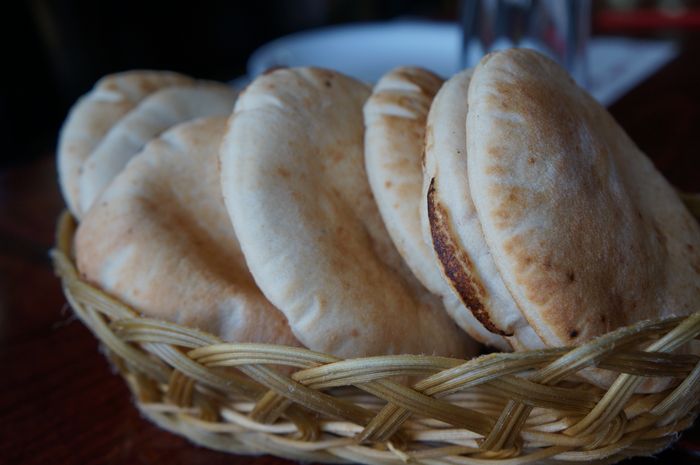
Hummus
A Middle Eastern dip made from cooked, mashed chickpeas blended with tahini, olive oil, lemon juice, salt and garlic. You can dip your pita bread in (it’s ok to use your hands) or put it in the pita along with other fillings. My favourite variety is topped with roasted pine nuts or meat, yum!
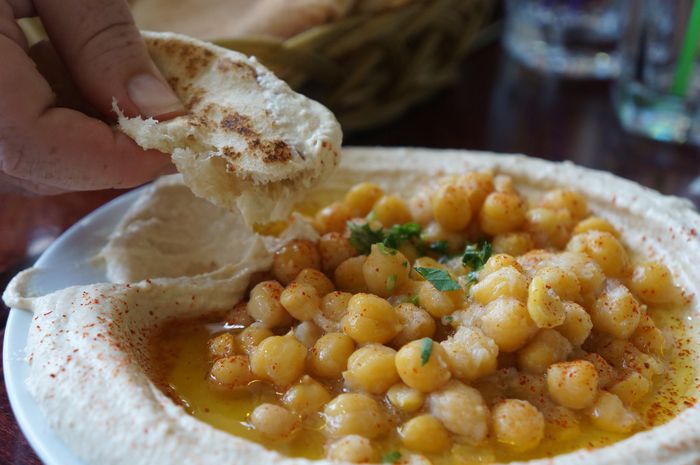
Kebab/Shashlik
Skewers of meat. Our favourite – the chicken skewer.

Shawarma
This is like the normal kebab you have back home. The meat is roasted on a vertical spit all day. When it comes time to eat, it is shaved off, cooked quickly and placed in a pita or baguette with your choice with hummus, tahini and salad. This is the fast food of Israel usually priced around 20NIS ($6AUD), and similar to Australia’s doner kebab or New York’s greek gyro.
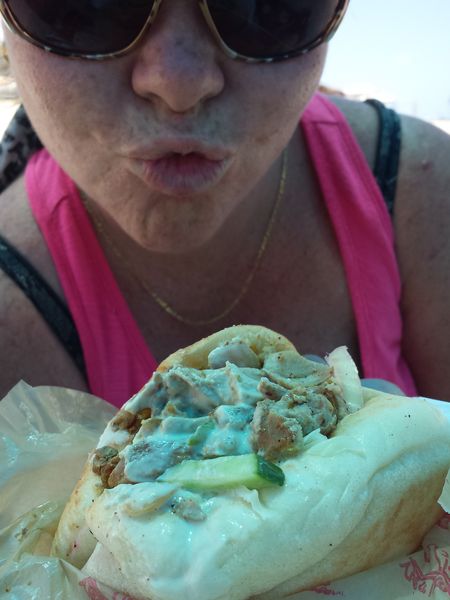
Falafel
A deep-fried ball or patty made from ground chickpeas, fava beans, or both. Falafel is a traditional Arab food and we love it in a Shawarma or by themselves. My 4 year old loves them, in fact we all do except Mr 3.
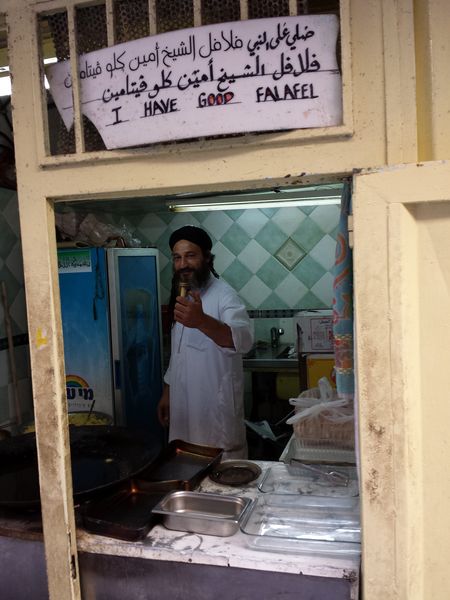
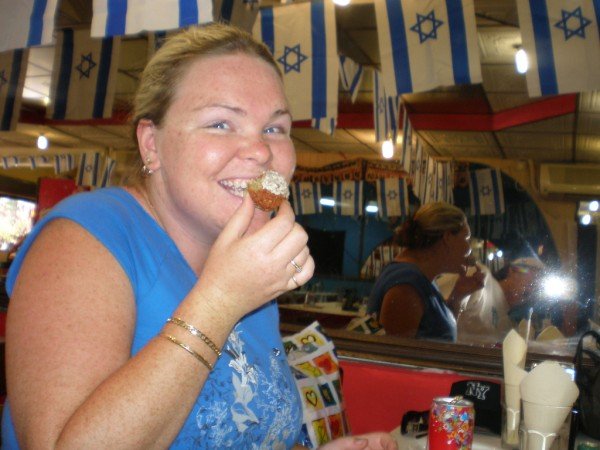
Dolma – Stuffed Grape Leaves
Grape vine leaves are stuffed with a combination of meat and rice, or sometimes even lentils. These are a Druze favourite and take many hours and delicate hands to make. I am not too much of a fan, but if you love sushi this will be right up your alley.
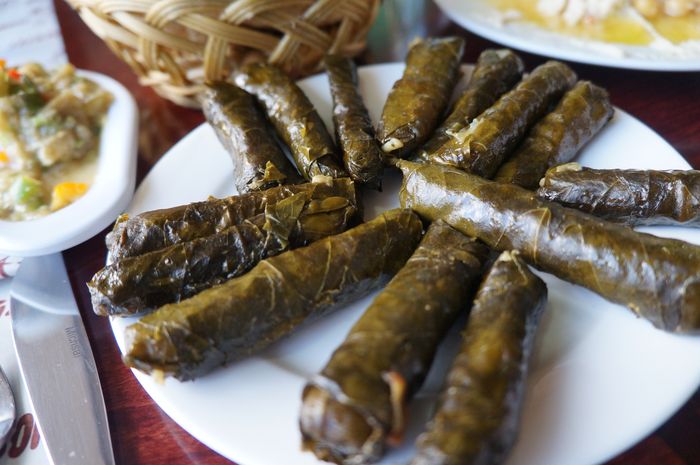
Baba ghanoush
This is a dip made from mashed baked eggplant mixed with olive oil and various seasonings. For the uninitiated it looks a little like hummus, but with a slightly darker colour and smoother texture. Try it if you dare.
Olives
It was only a couple of years ago I started eating olives now I can’t get enough of them. Here they come in all shapes and sizes, and are often found in salads or by themselves as accompaniments with most meals. The most common variety are the Kalamata or black olives. Oh how I love olives, one of my favourite parts of Israel.
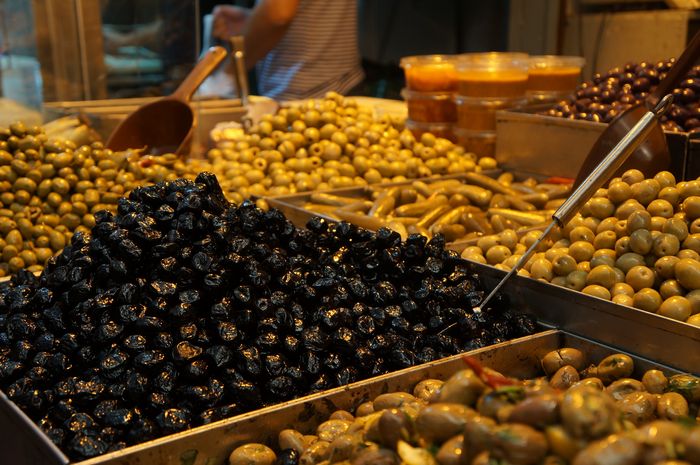
Labane
This is plain yoghurt which has been strained in a cloth or paper bag or filter to remove the whey, giving a consistency between that of yogurt and cheese, while preserving yogurt's distinctive sour taste. It is a popular breakfast spread for pita. Like hummus, you can dip or spread it. We had it at most hotels/hostels for breakfast – yum!
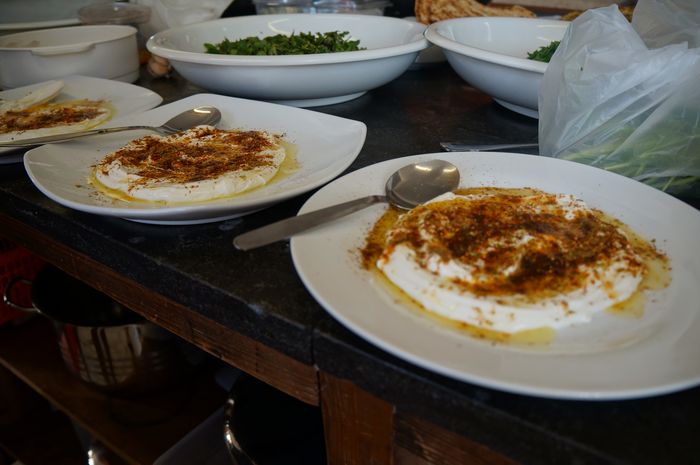
Halva
Halva means sweet. In Israel it refers to a crumbly dessert usually made from tahini (sesame paste) or other nut butters, such as sunflower seeds. The primary ingredients are nuts, butter and sugar. To me it tastes like sweet tahini and I wasn’t a fan, although the chocolate versions were better.
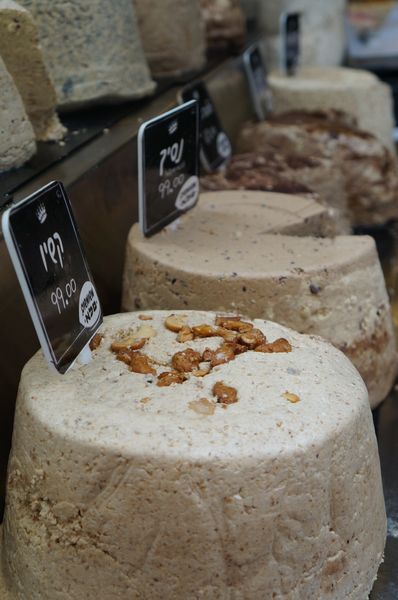
Tahini
A paste made from ground, hulled sesame seed. To be honest, I don’t like it very much, it tastes like a weird peanut butter. But definitely worth trying, we even got to make some in Nazareth. It’s often used as a dressing on meats or a dip for pita bread.

Tabbouleh
Tabbouleh is a salad traditionally made of bulgur, tomatoes, cucumbers, finely chopped parsley, mint, onion, and garlic and seasoned with olive oil, lemon juice, and salt. My husband makes his own and has yet to find one as good (he’s allowed to be a perfectionist). I am really not a fan of this parsley overload, but it’s supposed to be good for you as well.
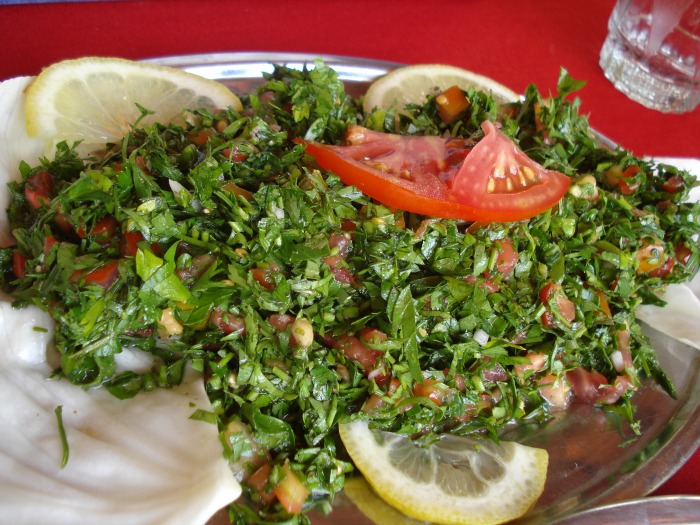
Baklava
This rich, sweet pastry is made of layers of filo pastry filled with chopped nuts and sweetened with syrup or honey. This has to be my favourite food by far in the Middle East. You may even find them in a local independent kebab shop in Australia or the USA.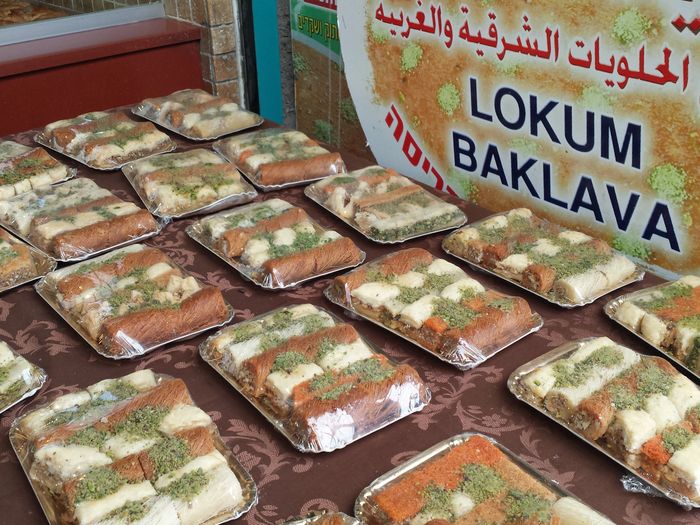

Mujaddara
Tasty cooked lentils together with various grains, generally rice, and garnished with sautéed onions. It looks like brown rice, but tastes better and very filling. I love it in a salad as well.
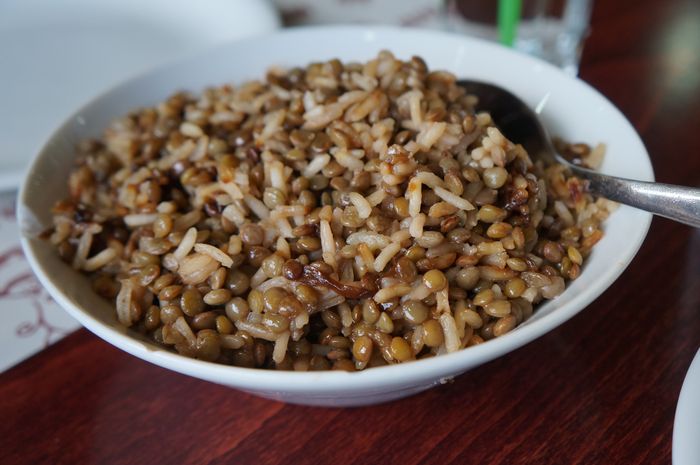
Salad
Many of the restaurants offer you some variation of a simple salad as a staple. Popular ones are pickled red or white cabbage, pickles, sweet corn, cherry tomatoes, etc.
A traditional meal at a restaurant usually consists of a plate of hummus with small plates for each salad, along with warm pita bread. Each diner on the table will typically have a small individual plate and can scoop small portions of each dish to mix-and-match their favourites. Remember it’s ok to use your hands, so roll up your sleeves and have some fun.
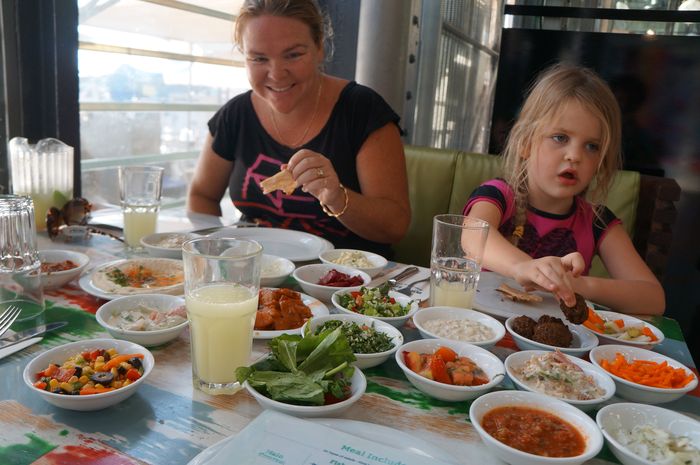
The most famous salad is the Arabic salad, which is diced tomato, cucumber and onion. Often mixed with parsley and combined with the juice of freshly squeezed lemon and olive oil. Unlike many Western salads, Arabic salad contains no lettuce, however some restaurants will add that for tourists. All the vegetables, except the onion, are left unpeeled, and the salad should be served immediately. It is served breakfast, lunch and dinner.

Of course Israel has many delicacies and these are just a handful of our favourites. Most of these delicious foods were served at a local restaurant in Daliyat al-Carmel where our first house was. The restaurant was called Samir and is run by a very friendly Druze called Samir. He was so welcoming and the food so delicious that we visited 1 – 3 times a week. Out of everywhere we ate in Israel I am ready to recommend at least here.
If you’ve never tried any of this before, go ahead and be adventurous – you never know, you might actually enjoy it.
Israel travel tip: Check out transport options from Tel Aviv to Haifa.








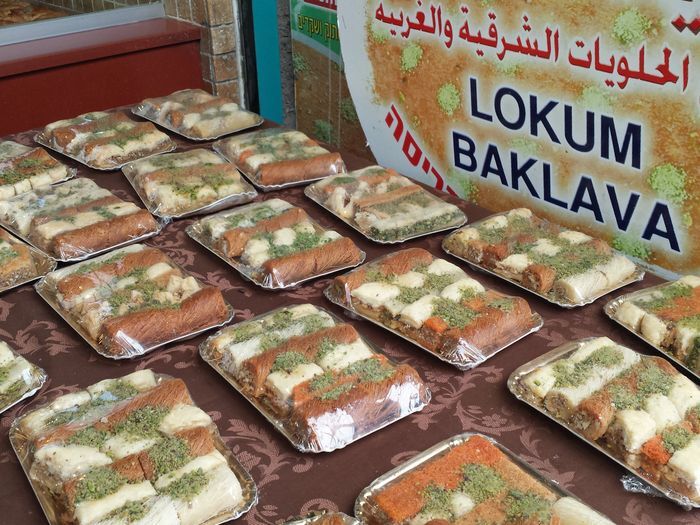

































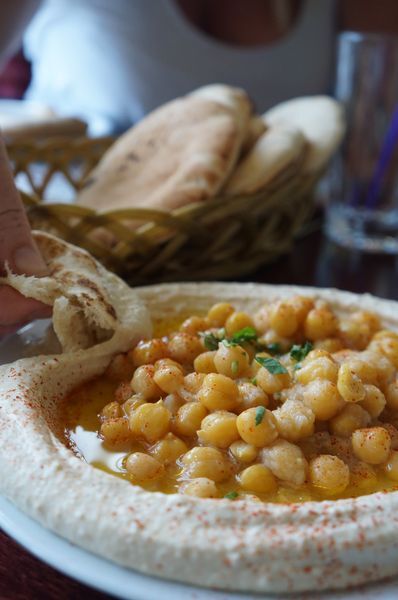




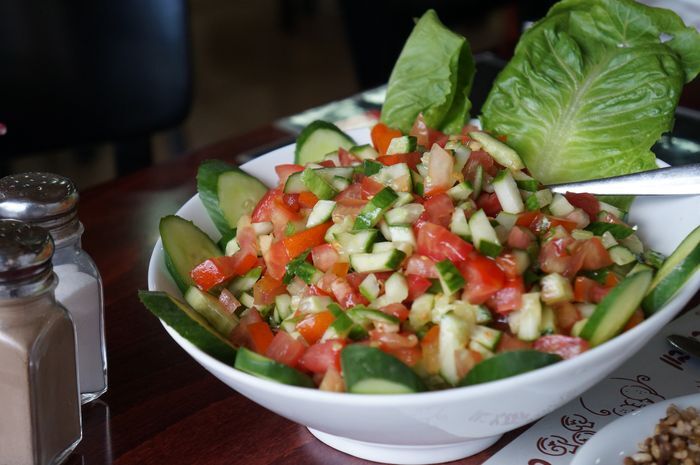



















Reader Comments...
"I respond to every comment by direct private email. I look forward to your feedback" - Josh BenderLovely post. I spent quite a bit of time in the Middle East particularly Syria, so this was like a walk down memory lane amazing people and great food. Looking forward to reading about your time in Turkey and what you get up to and prices, accommodation etc as I would like to spend a few months there myself next summer with two small children . There is a Turkish airline called Pegasus that do what seems to be cheap internal flights around Turkey. Have fun.
It all sounds really yummy!!!! I'd give everything on the list a go. :)
Okay these pictures are amazing and everything looks delicious. I am wondering how you found time to actually visit places. I might have just stayed at the restaurants all day! Yum!!
Oh this all looks so yummy! I didn't realize how much of this food I already love. Now I need to go just to eat.
I love Middle Easter food...this all looks delicious!! Great tips for those traveling to Israel.
wow, those all look yummy
come and share these with us for Travel Photo Mondays link up, its up all week
Delish! The photos are mouthwatering...
What deliciousness! Not a good post to read before having leftovers for dinner :)
Drooling over that hummus...
This looks delicious, I do like a bit of hummus, I'm feeling really hungry now!
Yum! I miss the Halva so much!
i loved you info about the food. I am leaving soon for 15 days in Egypt, Israel and Jordan. I cannot find any information on essential oils. Are they allowed to be brought into the country? They are in dark small bottles. They are expensive so I would not want them confiscated. Thanks so much if you know the answer to this.
Write Your Comment
Please DO NOT include links, URLs or HTML in your comments - they will be automated deleted and you will waste your time.